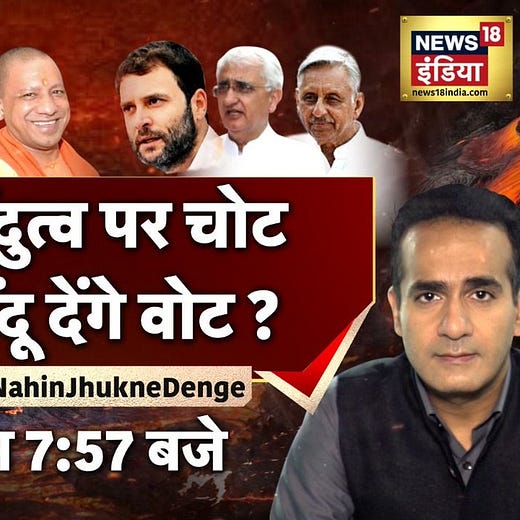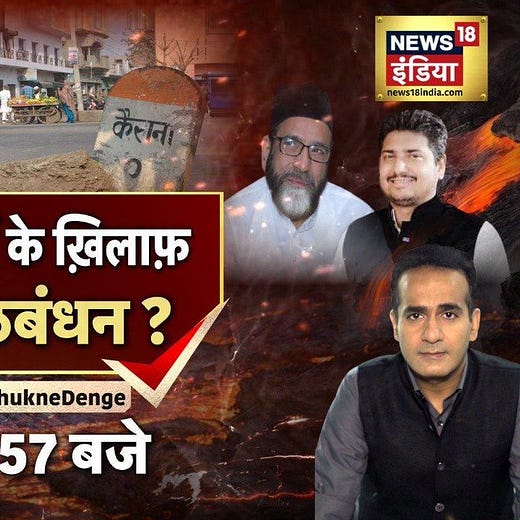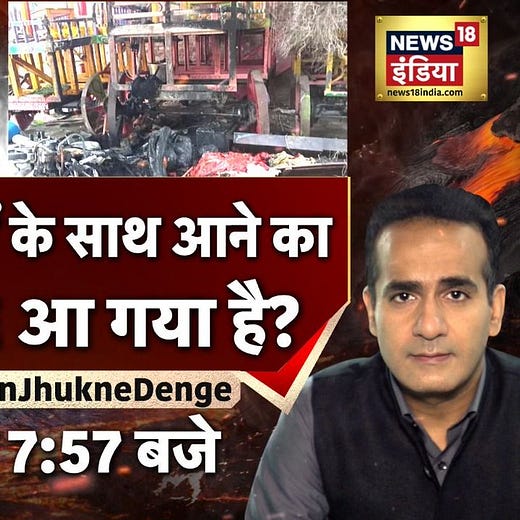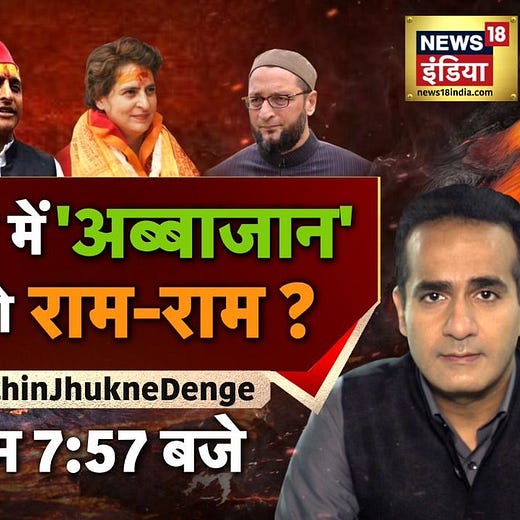Genocide Watcher Wants US Congress to Warn India; Poor Country With Affluent Elite, It’s Going Nowhere
Ambani channel's hate-promoting debates, Lamborghini sales soared while 46 million Indians slipped into extreme poverty, PM-CARES shortchanged vaccines, and why surveillance is endemic in India
A newsletter from The Wire & Galileo Ideas | Contributors: MK Venu, Seema Chishti, Siddharth Varadarajan, Sidharth Bhatia, Sushant Singh and Tanweer Alam | Editor: Pratik Kanjilal
Once a week, we relax The India Cable’s paywall so non-subscribers can sample our great content and take the next step of paying Rs 200/month or Rs 2000/year to get our newsletter in their inbox every day.
If you already subscribe, spread the good word. And if you aren’t a paying subscriber, click here:
Snapshot of the day
January 20, 2021
Pratik Kanjilal
In the first sentencing in the Delhi riots case, Dinesh Yadav has been given five years for rioting and arson. He was convicted a year ago.
BJP MP Tapir Gao says that the Chinese People’s Liberation Army “has abducted Miram Taron, 17 years, of Zido village on January 18 from inside Indian territory… [in] Arunachal Pradesh.” He also claims that China had built 3-4 km of road in that area inside India in 2018. The abduction has been confirmed by the local police, who have informed the Army. In turn, the Army has sought the help of the PLA to locate the boy.
Army Chief Gen MM Naravane remains very optimistic about ongoing military talks with China. In a TV interview, he stressed that dialogue will resolve differences. “Every time we talk to each other, we understand each other’s positions and whatever differences are there, we’re able to dwell on it and reach a point.”
For the first time in the ongoing Covid-19 wave, the number of daily new cases in India crossed the 3 lakh mark. India recorded 3,13,603 new cases yesterday, up 27% in just a week. Well into the third wave, lack of concern for frontline health workers continues. Contractual nurses work long hours at great risk, but are denied firm jobs by hospitals.
Automobili Lamborghini reports its best-ever sales performance in India in 2021, a growth of 86% over the previous year. The company sells super luxury cars with prices starting at Rs 3.16 crore in India. In the same period, 4.6 crore Indians slipped into extreme poverty. That’s the India story (see The Long Cable below).
If crude oil crosses $100 a barrel, as has been forecast, it will bring a considerable period of pain for India ― higher inflation, fiscal deficit and trade deficit, reports the Hindustan Times. If the Budget does not bring down taxes on fuels and crude does cross $100, fuel prices will be significantly higher than when crude was above $100 a decade ago, because taxes are significantly higher now and capacity utilisation is lower at around 60%. Apprehensions about inflation have already brought the Sensex down 1,600 points in three days.
Dalit leader Chandrashekhar Azad has declared his candidacy against Uttar Pradesh Chief Minister Adityanath from the Gorakhpur constituency. His party is called the Azad Samaj Party (Kanshiram). He was earlier in talks with the Samajwadi Party for a seat sharing agreement but the two sides could not reach agreement.
Modi’s interrupted WEF speech, failed teleprompter or not, has inspired cartoonists and meme-makers, reports Scroll.
In Gujarat and Telangana, the number of claimants for the Rs 50,000 ex gratia for Covid-19 deaths is nine and seven times the state governments’ official figures. Murad Banaji says this is no surprise, as “excess deaths… likely number 3-5 million in India, or 6-11 times the official toll.”
The latest Centre-state flashpoint is proposed changes in managing civil servants’ postings. The Union government informed states last week of its plan to acquire overriding powers to transfer IAS and IPS officers through Central deputation, nixing the need for approval by state governments. Six states have already objected.
A Delhi court has ordered that former JNU student Umar Khalid be produced in court “in a routine manner” and not in “handcuffs and fetters” in the 2016 JNU sedition case. Earlier, in a Delhi riots case, the court pulled up the police for seeking to bring Khalid and United Against Hate founder Khalid Saifi to court handcuffed. It said the plea was “devoid of merits” and filed in a “mechanical manner”.
The tech world is not so virtual after all. It reflects some of India’s worst-kept secrets ― the caste system is well established in it, reports restofworld.org.
Tennis star Sania Mirza has announced her retirement after the 2022 season. “I do feel my recovery is taking longer, I’m putting my three-year-old son at risk by travelling so much with him,” Mirza said at the Australian Open.
El Universal de Cartagena reports that Gabriel García Márquez and Mexican writer Susana Cato’s daughter, born out of wedlock, was named Indira, after Indira Gandhi, “whom García Márquez admired and who was reported to have been the first to congratulate him when he was awarded the Nobel Prize for literature in 1982.” Indira Cato is a respected documentary filmmaker in Mexico.
Smriti Mandhana has been named in ICC’s T20I women’s Team of the Year, but there is no Indian in the men’s side, which features three Pakistanis including skipper Babar Azam.
Reservation does not negate merit, says Supreme Court
Providing detailed reasoning for a brief order it pronounced earlier this month upholding OBC reservation and a Rs 8 lakh cut-off for economically weaker sections. the Supreme Court said on Thursday that reservation is not at odds with merit and has to be socially contextualised. It noted that mere exam performance could be misleading because it does not account for the social advantages that candidates from certain backgrounds accumulate over time.
PM-CARES just didn’t care
The promised shot in the arm turned out to be a stab in the back: the Union Health Ministry, Indian Council of Medical Research and the Department of Biotechnology all said that they didn’t receive any money from a Rs 100 crore PM-CARES (Citizens Assistance Relief in Emergency Situations) fund announced by the government in May 2020 for vaccines. The fund for vaccine development was part of a Rs 3,100 crore package under PM-CARES to buy 50,000 ventilators and help migrant workers.
It also turns out that the Department of Biotechnology has disbursed less than 15% of its Rs 900 crore Mission Covid Suraksha fund on vaccine development, promised more than a year ago and valid for 12 months. But 14 months later, Rs 116 crore has been disbursed to five vaccine developers and Rs 78.96 lakh was given to Faridabad-based Translational Health Science and Technology Institute for R&D support. This was disclosed by the Biotechnology Industry Research Assistance Council (BIRAC) ― a wing of the DBT ― to transparency activist Commodore Lokesh K Batra under an RTI reply.
Genocide Watch warns US Congress about India, Facebook report delayed
Gregory Stanton, founding president of Genocide Watch, says that PM Narendra Modi has a moral obligation to denounce hate speech. He’s asked “the US Congress to pass a resolution that warns that genocide should not be allowed to occur in India.” He identified early warning signs for genocide: classification (distinguishing between people and othering some), symbolisation (identifying people by their clothes or epithets like Abbajaan), discrimination (the Citizenship (Amendment) Act), dehumanisation (“termites”, “go to Pakistan!”) and polarisation (‘love jihad’ accusations and discriminatory laws against inter-marriage). He said there have also been actual calls for genocide, akin to the definition under the Genocide Convention, to which India is a signatory.
Former Facebook employee Frances Haugen and other whistleblowers renewed calls for Facebook to release a long-awaited report on its impact in India, alleging the company is deliberately obscuring the role of the world’s biggest social media platform in amplifying hate in India. Facebook (now, Meta) had commissioned law firm Foley Hoag in 2020 to carry out an independent review of its impact in India – the company’s largest market with 340m users – but its release has repeatedly been delayed, allege activists.
Press bodies denounce proxy coup at Kashmir Press Club
Media watchdog Reporters Without Borders (RSF) has said that the government of India should immediately reopen the Kashmir Press Club, which was deregistered and taken over by the administration last week. It held authorities responsible for helping a group of journalists lead a “state-backed coup” which led to the closure of the press club.
“We call on Jammu and Kashmir Lieutenant Governor Manoj Sinha to immediately restore the KPC's licence and order its reopening,” the head of RSF’s Asia-Pacific Desk Daniel Bastard said. "This society's closure is clearly the outcome of a coup hatched… by the local government, which follows Prime Minister Narendra Modi's orders. This undeclared coup is an Indian government insult to all journalists trying to do their job in the Kashmir Valley, which is steadily being transformed into a black hole for news and information," he added. The Foreign Correspondents’ Club of South Asia has also expressed deep concern, as have the Chennai and Delhi press clubs.
In Udupi, hijab bar continues
For three weeks, eight students at a government pre-university college for girls in Udupi, Karnataka, have been disbarred from classrooms for wearing the hijab. A furore on social media has drawn reporters and police cars to the inconspicuous Women’s Government Pre-University College, reports the News Minute. About 70 Muslim girls study there. The ones in headscarves say that their stand is a matter of individual choice, part of their faith.
Students of commerce and science in classes 11 and 12, they say they have not attended classes since December 27, on the directions of college principal Rudre Gowda. They have been marked absent.
The Long Cable
Poor country with affluent elite, India is going nowhere
Jayati Ghosh
The Paris-based World Inequality Lab has become a major source of data on global inequality, based on careful aggregation of national data from a multitude of sources, of both income and wealth inequality, at national, regional and global levels. Their latest World Inequality Report 2022 is an eye-opener, even for those who know that economic inequality has increased massively in recent years. It shows that globally, inequality is now as great as it was at the pinnacle of Western imperialism in the early 20th century. The process began nearly four decades ago, but worsened during the pandemic, which sharply exposed and amplified existing inequalities.
India is now one of the most unequal countries for both income and wealth inequality — and has shown the most rapid increases in inequality. This emerges clearly even though, as the report laments, “Over the past three years, the quality of inequality data released by the government has seriously deteriorated, making it particularly difficult to assess recent inequality changes.” We know that the central government has tended to suppress inconvenient information and manipulate data, refusing to release the results of the 2017-18 national consumer expenditure survey and playing fast and loose with definitions to artificially increase the number of ‘formal’ workers.
Despite these desperate efforts to hide the actual patterns, certain trends are unmistakable. By 2020, the income share of the bottom half of the Indian population was estimated to have fallen to only 13%, while the top 10% captured 57% of national income and the top 1% alone got 22%.
In terms of wealth distribution, the reality is even starker. We know that the past few decades have been a period of increasing wealth concentration globally: the top 1% captured nearly two-fifths of all global wealth growth. The wealth of the top 52 billionaires (which include our home-grown Mukesh Ambani and Gautam Adani) increased by nearly 10% each year between 1995 and 2001. In India, the rate of increase of private wealth and its concentration at the top have been even sharper. The poorest half of the population have less than 6% of the wealth, the top 1% grab more than one-third and the top 10% nearly two-thirds.
The pandemic was a particularly happy period for the extremely wealthy as another recent report on inequality from Oxfam points out — the wealth of the 10 richest men in the world doubled, while 99% of the world’s people are worse off. One of the biggest increases in wealth was that of Gautam Adani, whose wealth multiplied eight-fold during the pandemic, and Oxfam notes that he made use of state connections to become the country’s largest operator of ports and its largest thermal coal power producer, wielding market control over power transmission, gas distribution, and now privatised airports — all once considered public goods (Oxfam 2022, page 20).
The increase in private wealth has been associated with a decline in public wealth, which is bad news for governments wishing to increase spending on citizens based on returns from public assets. For India, the World Inequality Report estimates that the ratio of private wealth to national income increased from 290% in 1980 to 555% in 2020, one of the fastest such increases in the world, throughout history.
India fares badly on other indicators of inequality as well. Women’s share of labour income, at 18%, is around half the global average, according to this novel estimate. This will come as no surprise to those who know how badly India treats its unpaid and underpaid women workers, even as the economy remains critically reliant on their work.
Another shock is the extreme inequality in carbon footprint within the country. On the face of it, India has very low carbon emissions per capita, at 2.2 metric tonnes per person per year. But this masks the fact that the bottom half of the population emits only 1 metric tonne per year, while the top 1% richest Indians emit 32.4 tonnes on average. That’s more than three times the annual average carbon emissions of the bottom half of the US population, and more than six times the emissions of the bottom half in Europe. Controlling the carbon emissions of the Indian rich would contribute greatly to reducing overall emissions, something that is rarely if ever mentioned in discussions by Indian policy makers. Globally and within India, inequality is not just killing people but destroying the planet.
We know that inequality is multidimensional: the income poor are more likely to live in poorer areas, to be women or girls, to belong to socially discriminated castes and communities, to be informal workers. More likely, therefore, to be unable to influence policy. No wonder the World Inequality Report finds that India stands out as a poor and very unequal country, with an affluent elite. Unfortunately, history tells us that such countries rarely progress very much. Radical redirection of policies is therefore essential for any real progress to occur.
(Jayati Ghosh is a development economist)
Reportedly
The Rashtriya Janata Dal’s Manoj Jha has been trying to get the Election Commission to act against Ambani-owned CNN-IBN, which has been putting out hate-filled, divisive and provocative ‘debates’ and posters advertising them. He says that all he has got is “criminal silence”. Jha has now urged all Opposition parties to boycott such hate-filled channels.
Meanwhile, the RJD social media handle pulls no punches and has been sticking to Lalu Prasad Yadav’s 1990s spirit ― trenchant and biting.
Prime number: 85 days
Three Kashmiri students allegedly posted social media messages congratulating the Pakistan cricket team for its win against India in the T20 World Cup, just as many other Indians did. For this, they have already spent 84 days in an Agra jail. Their bail hearing has been postponed seven times and their poor families are frantic, struggling to find money for legal costs.
Deep Dive
‘Economic Growth in Uttar Pradesh in Recent Years: Rhetoric and Reality’ scrutinises the tall claims of the state government, using official figures of state GDP, and shows that in four years of the Adityanath government, per capita income in UP has increased merely by 0.43%, though 100% growth is claimed. Here is a digital-friendly version.
Op-Eds you don’t want to miss
People behave badly when their real world reputation is not affected by what they say online, so the proliferation of pseudonymous social media identities may amplify already existing problems, writes Karthik Sreenivasan.
Anurag Behar writes that a staggering crisis in education confronts us today, unprecedented in India’s history. Over 200 million children have lost two years of learning and more. If the states do not address this, we will have a learning-lost generation.
Ever since India thwarted Pakistan’s bid to gain control of the Saltoro Ridge and the Siachen glacier in 1984, Pakistan’s objective has been to see the Indian Army come down from its positions. Vivek Katju writes that it is important for the government to clarify its stand on demilitarisation of the glacier.
The Devas case is not as black and white as the government claims, says Mint, as the company was wound up on fraud charges which stand on specious grounds, and were not tested in criminal court. It has also won substantial sums in multiple international arbitration proceedings.
A party known for planning and hard work, with access to unlimited resources, the BJP appears to have suddenly and embarrassingly run out of ideas in UP, writes Srinand Jha.
The Franco judgment's ‘ideal victim’ is a demure virgin who is outspoken about sexual acts, writes Geetika Mantri. Socio-cultural stereotypes of a ‘real’ victim are myths that dismiss the lived experiences of scores of survivors.
Gautam Bhatia explains why marital rape cannot be an exception, as this “creates a legal fiction”. Here is another piece on his blog, with more legal arguments.
Except for Kerala, we observe the NFHS findings strongly challenging the claimed achievements under Swachh Bharat Mission for most other states, writes PC Mohanan.
“To put it bluntly, the Forest Survey of India report is not worth the paper it’s printed on if it can’t distinguish natural forests from cotton and sugarcane fields,” says Ritwick Dutta.
Australian skipper Pat Cummins supporting Usman Khawaja during the Ashes victory celebrations should be a great step forward for players of under-represented backgrounds everywhere, and especially so for those of South Asian origin, writes Brian Stoddart.
Shashi Deshpande remembers Maria Aurora Couto: “‘Courage, honesty, wealth of knowledge, breadth of interests’ ― words written by my friend Aurora for me, words she meant. Words which could apply to her and her writing as well.”
Listen Up
“During the World Cup, we earned respect, not money.” Director Kabir Khan spoke to Anupama Chopra weeks after the release of 83. They dissect the response to the film, based on India’s first-ever victory in the cricket World Cup. Khan reveals what Kapil Dev told him.
Watch Out
How and why has surveillance been a feature of India’s governance for so long? What underlying frameworks enable it? Meghna Bal, Fellow at Esya Centre, explains.
Over and Out
Kerala’s first hyperlocal delivery startup Errando launched the world’s first WhatsApp API-powered delivery service. Customers can send a hello on WhatsApp to order food, stationery, medicine and groceries, or schedule pickup and drops.
Indian actor, politician and filmmaker Kamal Haasan will return as the host of Big Boss Ultimate, a Tamil version of the Big Brother format, reports Variety.
There is an Urdu Wordle too now ― Urdle.
That’s it for today. We’ll be back with you tomorrow, on a device near you. If The India Cable was forwarded to you by a friend (perhaps a common friend!) book your own copy by SUBSCRIBING HERE.





